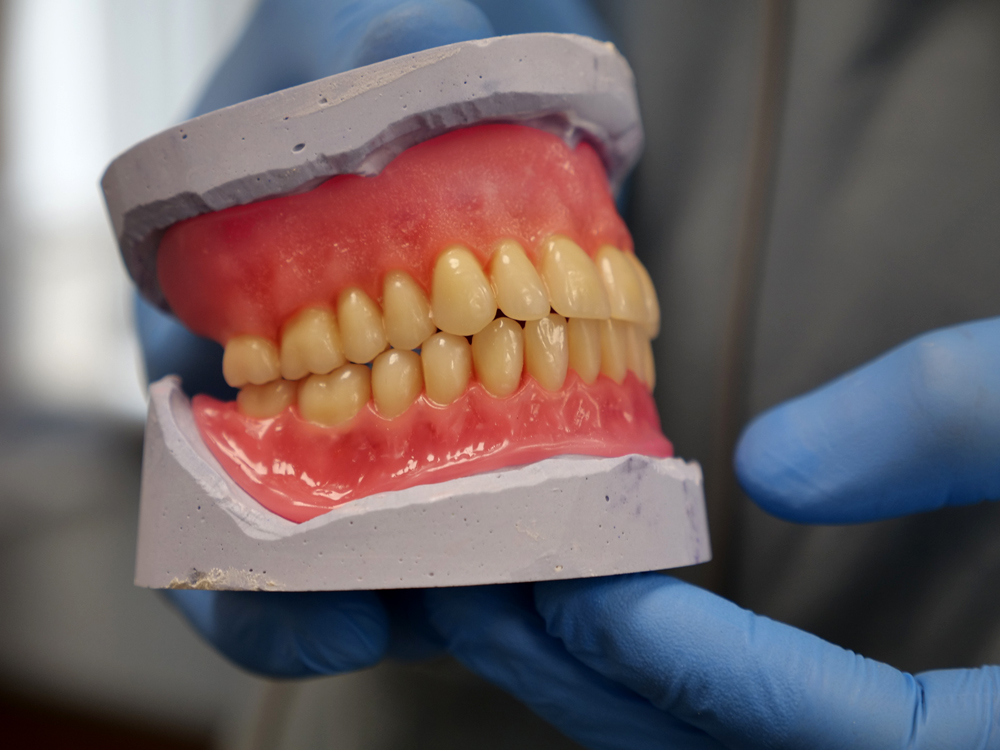Dentures

What are dentures?
A denture is a removable device which is used to replace one or more teeth. If it replaces all of the teeth it is called a full denture, if some teeth remain then it is a partial denture. The bases can be made of different materials, acrylic (plastic), chrome cobalt (metal)or metal-free alternatives, or a flexible nylon material called Valplast. The teeth used on these are made of various shades of plastic or porcelain and can match your own teeth very well.
Benefits of dentures?
- Missing teeth affect a person’s self-confidence and well-being. Cosmetic dentures can really enhance a person’s appearance and improve their well-being.
- If spaces are left then the adjacent teeth and opposing teeth can move, destroying the correct bite and often with associated sensitivity, spaces, and more gum disease. A well fitted denture will alleviate these issues.
- Missing teeth can lead to problems with speech and chewing and a denture can certainly correct these.
- When teeth are lost the gum and bone also shrink back and the cheeks and lips are not supported correctly giving a sunken appearance. The denture can be used to replace these missing tissues and improve the aged appearance.
How are dentures made?
There will normally be four visits to make your denture. The first visit we take impressions of your upper and lower jaws using average size impression trays which then allows the dental laboratory to make a tray specially made for each patient. At the second visit the special tray is used to make a very accurate impression of the mouth and we will also record how your teeth bite together. At the next appointment we will try-in a wax prototype denture to ensure a good fit, correct bite and that we are happy with the appearance. We will not proceed to the final fitting stage until we are sure that the denture has been designed as well as possible. The final visit will be to fit your new denture. We will check the fit, and the bite and give you instructions on how to care for your new denture. Watch the video below to see how dentures are made.
How long do dentures last?
Like anything, the better you look after the new denture and your remaining teeth, the longer it should last. We would expect an acrylic denture to last for about 7 to 10 years before needing replacement. The denture teeth are made of a plastic material and will wear down over time. Also, care should be taken in handling the denture as they are fragile and can break. We use high strength acrylics to make as strong as possible but a fall onto the floor or drop into a sink may cause fracturing. Also, the loss or movement of a tooth adjacent to the denture will affect the fit and make it looser. If this happens, we can often return the denture to the laboratory and repair and improve the fit. If you have any worries about the fit or any damage to a denture come and see us and we can often make changes to your existing denture without the need for a more costly replacement.
What are the alternatives to a denture?
Dental implants can often be used instead of a denture and will provide a much more stable and retentive alternative as they are fixed directly to the jawbone. Also, in some circumstances a fixed dental bridge may be a possibility.
What are the disadvantages of having a denture?
It is important to have realistic expectations of a denture. They are removable and not permanently fixed to your teeth and so you will always detect some movement during use. Getting used to them initially can be difficult and can take time to adapt during which time it is common to have some discomfort. We will normally check your new denture a week after fitting to ensure that the fit is good, and you are managing.
After first fitting you may experience a change in your speech, but this will soon improve if you practice reading out loud at home.
Having a denture in your mouth for much of the day it holds plaque against your remaining teeth and unless you keep your denture and mouth exceptionally clean then you will be prone to getting gum disease and dental decay.
How do I look after my denture?
Dentures need cleaning regularly. They are delicate and can break if you drop them. Always clean them over a sink of water or something soft such as a towel in case you drop them. If it’s possible remove them after every meal as food will collect around them. Firstly, rinse, then brush gently with a soft brush using toothpaste, and rinse again. Once a day it is useful to soak the denture in a denture cleaner such as Steradent for an acrylic denture, Dentural for a chrome cobalt denture, or Val-clean for a flexible denture. It is important to follow the manufacturer’s instructions carefully. One common mistake is to use water too hot which will have the effect of bleaching the denture.
To prevent build-up of stains and tartar it is important to clean and soak the dentures regularly. The use of a sonic denture bath will make the soaking process more effective.
Many of the new soaking tablets or solutions work very quickly and may less than five minutes. After removing the denture from the effervescent soaking solution it’s important to rinse, brush and rinse again before placing the denture back in the mouth.
Will my dentures look false?
Current materials and techniques allow us to make very natural looking and hard wearing dentures. Cosmetic dentures can enhance the appearance by replacing mis-shaped, badly positioned, or discoloured teeth. We can use different coloured plastics to blend in naturally with your own gum colouration and this plastic gum is used to replace the tissue which was lost during healing and helps to support fully the lips and cheeks to prevent sagging and creasing of the tissues. Without this support a person will look older, and struggle more with eating and speech can also be affected.
How long should I wear the new denture?
You should try to wear the new dentures as long as possible. It often helps if it is your first set of dentures, to wear them at night as well as during the day but only for the first week. Only remove them to clean the dentures and brush your teeth. It is much healthier once you are used to them to take the dentures out whilst sleeping.
How often should dentures be checked?
Whether you have a full or partial denture, it is important that you have your denture, and natural teeth checked regularly by your dentist. It’s recommended with full dentures to be checked annually, but if you have some of your own teeth then you will probably be examined more frequently in order to keep the remaining teeth healthy. After all it is these teeth which are helping to keep the denture firm and stable.
These examinations are important to ensure that the tissues in your mouth are healthy and that the dentures are still fitting well.
With regular professional care, a positive attitude and persistence, you can be one of the millions of people who wear their denture with a smile.

